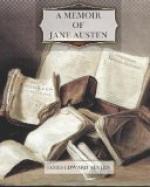All writers of fiction, who have genius strong enough to work out a course of their own, resist every attempt to interfere with its direction. No two writers could be more unlike each other than Jane Austen and Charlotte Bronte; so much so that the latter was unable to understand why the former was admired, and confessed that she herself ’should hardly like to live with her ladies and gentlemen, in their elegant but confined houses;’ but each writer equally resisted interference with her own natural style of composition. Miss Bronte, in reply to a friendly critic, who had warned her against being too melodramatic, and had ventured to propose Miss Austen’s works to her as a study, writes thus:—
’Whenever I do write another book, I think I will have nothing of what you call “melodrama.” I think so, but I am not sure. I think, too, I will endeavour to follow the counsel which shines out of Miss Austen’s “mild eyes,” to finish more, and be more subdued; but neither am I sure of that. When authors write best, or, at least, when they write most fluently, an influence seems to waken in them which becomes their master—which will have its way—putting out of view all behests but its own, dictating certain words, and insisting on their being used, whether vehement or measured in their nature, new moulding characters, giving unthought of turns to incidents, rejecting carefully elaborated old ideas, and suddenly creating and adopting new ones. Is it not so? And should we try to counteract this influence? Can we indeed counteract it?’ {126}
The playful raillery with which the one parries an attack on her liberty, and the vehement eloquence of the other in pleading the same cause and maintaining the independence of genius, are very characteristic of the minds of the respective writers.
The suggestions which Jane received as to the sort of story that she ought to write were, however, an amusement to her, though they were not likely to prove useful; and she has left amongst her papers one entitled, ‘Plan of a novel according to hints from various quarters.’ The names of some of those advisers are written on the margin of the manuscript opposite to their respective suggestions.
’Heroine to be the daughter of a clergyman, who after having lived much in the world had retired from it, and settled on a curacy with a very small fortune of his own. The most excellent man that can be imagined, perfect in character, temper, and manner, without the smallest drawback or peculiarity to prevent his being the most delightful companion to his daughter from one year’s end to the other. Heroine faultless in character, beautiful in person, and possessing every possible accomplishment. Book to open with father and daughter conversing in long speeches, elegant language, and a tone of high serious sentiment. The father induced, at his daughter’s earnest request, to relate to her the past events of his life.




